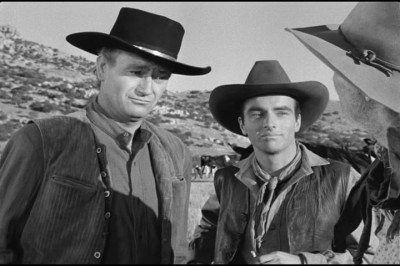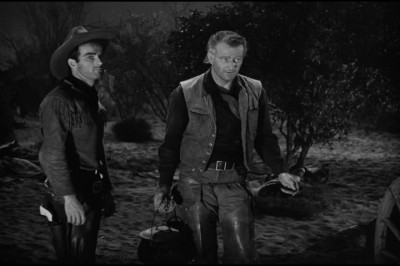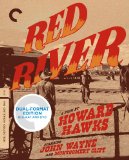| Reviews & Columns |
|
Reviews DVD TV on DVD Blu-ray 4K UHD International DVDs In Theaters Reviews by Studio Video Games Features Collector Series DVDs Easter Egg Database Interviews DVD Talk Radio Feature Articles Columns Anime Talk DVD Savant Horror DVDs The M.O.D. Squad Art House HD Talk Silent DVD
|
DVD Talk Forum |
|
|
| Resources |
|
DVD Price Search Customer Service #'s RCE Info Links |
|
Columns
|
|
|
Red River
Growing up in a household with one parent who was an unabashed John Wayne fan, I grew to appreciate his work but in different ways. I have grown to realize that Wayne was a bit of an underrated actor in his time, and with Red River this was one of (if not) his first turn from preconceived notions on his character and how he turns from upstanding protagonist to a less than palatable one. Nevertheless, having not recalled his supporting character when Wayne has undergone similar metamorphoses, I was curious to see what Red River would posit.
Charles Schnee (The Butterfield 8) and Borden Chase (The Fighting Seabees) adapted a screenplay based on Chase's novel that Howard Hawks (The Big Sleep) directed. Wayne plays Thomas Dunson, a rancher who is attempting to bring a large herd of cattle to Texas/ During the quest, he lost his girlfriend during an Indian attack in the middle of it. Flash forward more than a decade later, and an orphaned boy named Matthew (Montgomery Clift, From Here to Eternity) eventually grows up and attempts to take away what Thomas has built through the years.

I am not going to lie, there is a historical context that not a lot of people are going to have that they would have otherwise, but seeing Wayne in Red River compared to other roles should give someone pause. He does not play someone who the viewer who root for (over Clift especially) with any ease, and the overt selfishness of Dunson is felt now maybe more than it did when the film was first released. But seeing Wayne in a change of pace had to feel disarming to what he was doing in previous roles and served to show people that he was not (should not?) dominate the stage as much as he should.
Clift helps this a great deal, not only from allowing Wayne to act the scenes of one in his later life, but more importantly, the scenes which highlight Clift do so well, and he plays the scenes with Wayne nicely. Which is to say, rather than be subservient to Wayne chewing on the scenery, Wayne lets his secondary ensemble members to well for themselves and in Clift, we get a man early in his career but showing hints of a pre-James Dean charisma or even sexuality that is hard to ignore.
But the frailty (maybe even vanity) of Dunson while mentioned in the last passage, cannot be overstated. Wayne plays him as a man who is almost obsessive with getting his herds to where they need. Anything that comes close to getting in the way of it is a threat, one which could be considered old-fashioned in a male storytelling perspective, and seeing Wayne play second fiddle to Clift in that regard is welcome now, though had to be surprising at the time.
Clift handles the role with good graces and stoicism, one that could have buckled at any (and every) thing that Wayne threw at him with varying levels of capitulation. There seems to be a subtle knowledge that as Matthew, Clift knows what the future brings for his character, and there is a level of pity that appears to be shown to Thomas when key decisions in a cattle move are made. It is virtually palpable that Matthew knows what the future is before Thomas does and the stoicism shows it but still remains fascinating in how Thomas still keeps his belief structure even though Thomas may reconsider it before he knows it.
That Wayne handled such a role soon after the end of World War II and barely an eye blink after his role in Stagecoach is amazing, particularly because it was an effective attempt to dispel the narrative at that point decades before many came to the realization. While the shedding of many people's preconceived notion of characters he was portraying was nice, seeing him in a position where he not only fits that bill but remains close to his character's objectives was encouraging to see.

There are some small overtures that the characters make, but Red River remains the first, best and even always look at Wayne's persona (or more specifically the cracks in it) which is fun to experience and seeing Wayne in a more submissive role is intriguing. Nevertheless, his first foray into characters that are more complex and Clift's character not only satiating this but also enhancing it is welcome. There are other films that may have accomplished seeking out Wayne's depth with better acumen (The Searchers) being the most recent and perhaps best example close to this performance, but Red River is the most significant message Wayne seems to communicate to break out from it one way or the other. That he decided to do it, and that such a polished and influential director like Hawks was around to capture it, is a testament to the faculties of both men.
The Blu-rays:The Video:
Two discs accompany Red River, one which houses the 127-minute version of the film, and a second which includes the 133-minute release (Criterion has put the latter on Disc One). Both have been given a 1.37:1 presentation in a 2K restoration transfer and they look excellent for a seven-decade old release. Standard definition discs are also here and serve as the source of the screen grabs, and the print itself looks clean and consistent throughout viewing. Considering Criterion had to recreate the theatrical print for the film from the pre-release 133-minute version, both look excellent.
The Sound:PCM soundtracks for both versions of the film, and they are free of hissing and chirping, all of the action sounds consistent with little adjustment and the music at the opening even sounds like it packs the tiniest oomph in the soundstage, along with the gunfire in an occasional moment or two. It is as clean as you can expect either version to be and sound decent, and without any complaint.
Extras:It's Criterion, okay? There is a bunch of extras on here and they are all pretty good. Disc One has "Bogdanovich on Red River" (17:02), where director Peter Bogdanovich talks about interviewing Hawks and his thoughts on bringing Wayne in, and some biographical information on Wayne and Clift, along with some info on Hawks for the film. He shares information on the characters and how Hawks worked, and recalled conversations with Hawks on the film, including thoughts on Hawks' style for it. Additionally, the two versions (and Howard Hughes' legal action forcing a second version) is touched upon. "Hawks and Bogdanovich" (15:32) includes information on the location, particular scenes and anecdotes, and insights on a couple of the characters, in audio footage from 1972. The trailer concludes the first disc (1:53).
Disc Two starts with a Lux Radio piece that recreates the film (59:12), where Wayne, Joanne Dru (who plays Tess) & Walter Brennan (Groot) reprise their roles from the film for this. There is an interview with critic Molly Haskell (15:43) where she shares her thoughts on Hawks' films and the western genre in general, along with the role of women in this film and how significant it was/is. It even looks at the two versions and is quite good. There is a second interview with historian Lee Clark Mitchell (13:07) where the historian discusses the origins of the novel and the rise in popularity of them, along with how the themes in the book play in the movie, and the requisite changes from book to film. There are also audio excerpts of a 1970 interview with Chase (10:16) where he talks about working with adapting the work and his work with Hawks for it, along with Howard Hughes' legal intervention in the film. A copy of the Chase novel "Blazing Guns on the Chisholm Trail" is included as an extra as well.
Final Thoughts:Not only does Red River includes the breakout performance of Montgomery Clift and the capable direction of Howard Hawks, it most importantly includes a substantial window to expand the role of John Wayne, perhaps tacitly approved by the studio. It may have been done better elsewhere, but his first effort was a tremendous one. If one has not seen it, I would recommend seeking it out immediately. If not, I would recommend seeking it out regardless for a bevy of bonus features to whet the metaphoric appetite.
|
| Popular Reviews |
| Sponsored Links |
|
|
| Sponsored Links |
|
|
| Release List | Reviews | Shop | Newsletter | Forum | DVD Giveaways | Blu-Ray | Advertise |
|
Copyright 2024 DVDTalk.com All Rights Reserved. Legal Info, Privacy Policy, Terms of Use,
Manage Preferences,
Your Privacy Choices | |||||||












